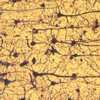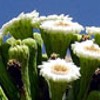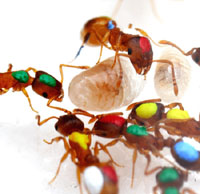ECOL 467/567: Pollination ecology
Behavior, cognition, and ecology of pollinators

description |

syllabus |

ECOL596V |

ECOL597S |

ECOL596H |

all EEB courses |

Soc. Ins. Lab |

description |

syllabus |

ECOL596V |

ECOL597S |

ECOL596H |

all EEB courses |

Soc. Ins. Lab |
| Date | Topic | Presenter | Reading |
| Aug 26 | Picking topics & dates | Dornhaus | - |
| Sep 2 | Foraging behavior by pollinators - effects on plants | Sevan Suni | Harder et al. 2001, Heinrich 1975 |
| Sep 9 | Optimal foraging and adaptation in foraging | Judith Ramirez | Chittka et al. 1999, Raine et al. 2006 |
| Sep 16 | Traplining and other search patterns | Fred Drumlevitch | Thomson 1995, Ohashi & Thomson 2005, Saleh & Chittka 2007 |
| Sep 23 | Communication and recruitment | Alexander Walton | Dornhaus & Chittka 2004b, NEW: Gruter & Farina 2009, optional: Dornhaus & Chittka 2004a, Gruter et al. 2008, Brockmann & Sen Sarma 2009 |
| Sep 30 | Pollinator cognition | Dan Papaj guest lecture | Raguso & Willis 2002, Lynn et al. 2005, skim this: Hebets & Papaj 2005 |
| Oct 7 | Learning, neural constraints, and foraging specialization | Chris Meehan | Waser et al. 1996, Chittka & Thomson 1997 |
| Oct 14 | Pollination syndromes | Nick Waser & Mary Price | Waser et al., Ollerton et al. 2009, optionally see this discussion in the literature: Smith et al. 2008, Fenster et al. in press, Smith et al. in press |
| Oct 21 | Social learning in pollinators | Kathleen Powers | Worden & Papaj 2005, Leadbeater & Chittka 2007, optional: Chittka & Leadbeater 2007 |
| Oct 28 | Flowers as acoustic stimuli | Judith Ramirez | v. Helversen et al. 2003, v. Helversen & v. Helversen 2003, optional: v. Helversen 2004 |
| Nov 4 | Traplining or Plant-pollinator coevolution | James Thomson guest lecture | Ohashi & Thomson 2009 |
| Nov 11 | Veteran's Day | no classes | - |
| Nov 18 | Evolution of pollination mutualisms | Judie Bronstein guest lecture | Herre et al. 2008, Sakai 2002, optional: Bronstein et al. 2006 |
| Nov 25 | Vertebrates as pollinators | Ted Fleming guest lecture | Fleming et al. 2009, optional: Fleming & Muchhala 2008 |
| Dec 2 | Biological Markets | Fred Drumlevitch | Ollerton 2006 |
| Dec 9 | Plant-pollinator (food) webs | Chris Meehan | Memmot 1999 |